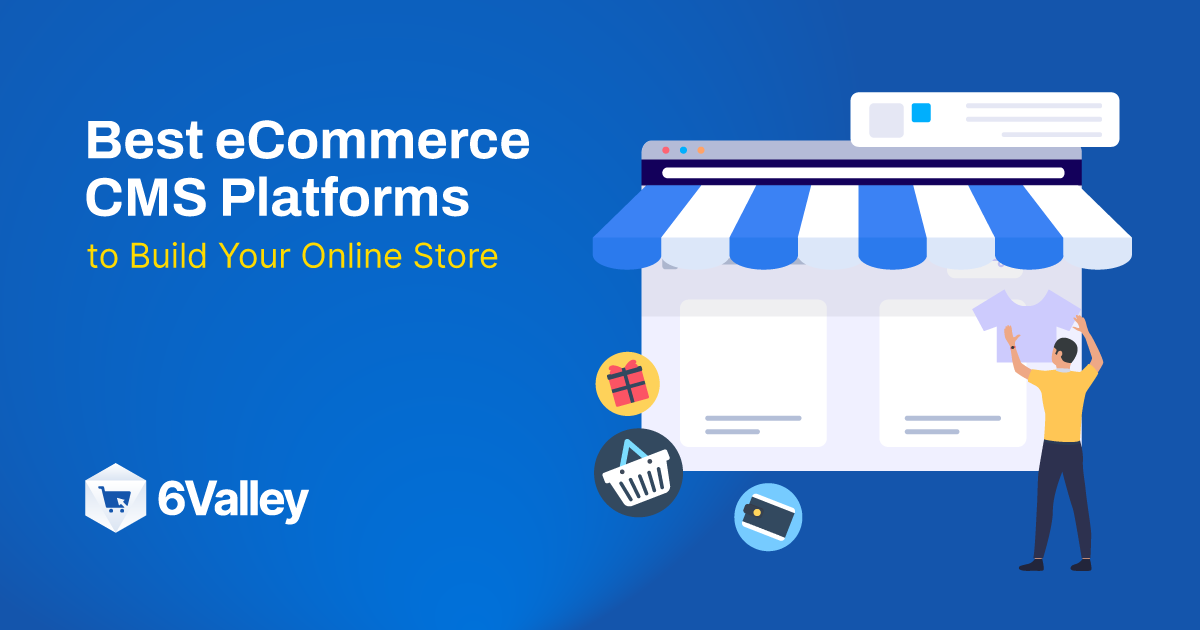Building an eCommerce website shouldn’t feel like building a Pyramid. eCommerce CMS platforms make it easy to manage and edit content without coding knowledge.
But reality hits when you try to find the best eCommerce CMS. We have been there and researched & searched endlessly on Google!
Guess what we found- The best out of the best ones! So, it’s time to stop feeling overwhelmed and start feeling overjoyed, as this blog will look into some of the best Multi Vendor CMS options out there for eCommerce business owners.
By reading till the end of this blog, you will know which platform to use to create your online store because we will dive into the details of every single platform.
What is eCommerce CMS?
An eCommerce CMS is a software that helps you create and manage your online store without having coding knowledge.
With an eCommerce content management system (CMS), you can add, change, edit, and design your online store to sell products easily.
Now before diving into the details of the platforms, it’s important to know what features make a CMS great among all. So here it goes-
Must Have Features of eCommerce CMS
Like a strong foundation is crucial for a building, a solid start is essential for your eCommerce store. It’s important to focus on specific features that can help you improve your website’s visibility and make your journey easier.
Below are the must-have features you should consider while choosing the eCommerce content management system (CMS).
Product Management
This is the heart of your store, so make sure your CMS allows you to –
- Add, edit, and delete products
- Inventory control
- Product categories and filtering
Marketing and SEO
To promote your business and attract more customers, you need these features:
- Search Engine Optimization (SEO) tools
- Email marketing integration
- Promotion and discounts
Secure Payment Process
To build trust and give customers an easy way to order from your business, you need:
- Integration option for multiple payment gateways
- Multiple payment options
User-Friendly Interface
An easily optimizable user-friendly interface ensures a smooth experience for visitors with the following:
- Drag and drop functionality
- Customizable templates or themes
- User-friendly dashboard
- Optimized for mobile devices
Customer Management
To build strong customer relationships, look for these features in the CMS platform:
- Customer account
- Order tracking
- Wishlist functionality
- Reward programs
Analytics and Reporting
Gain valuable insight into your store’s performance by having access to:
- Sales reporting
- Customer behavior analysis
- Website visitors analysis
Security
Protect your customers’ data with advanced security features like:
- SSL encryption
- PCI compliance
- Regular security updates and backups
Best eCommerce Software and Platforms for Online Stores
After checking out many features, we’ve chosen the 16 best eCommerce CMS platforms list for you.
This list has both open-source and SaaS CMS platforms.
1. WordPress+ WooCommerce
2. Shopify
3. Magento / Adobe Commerce
4. 6Valley
5. Jumpseller
6. Drupal
7. Joomla
8. Big Commerce
9. Presta Shop
10. Wix eCommerce
11. Squarespace Commerce
12. Open Cart
13. HubSpot
14. Sitecore
15. Shift4Shop
16. Zen Cart
Now comes the main part- I know you have been waiting to know in depth about the best ones to decide quickly for yourself. So, without any delay, let’s get started.
1. WordPress + WooCommerce
It is simple and the most popular open-source CMS platform that is available online. It allows you to build a fully functional eCommerce shop with the help of plugins and themes. As it is an open-source CMS platform you won’t have to get worried about your wallet while using the basic technology this platform offers with many free themes.
Using the popular open source plugin WooCommerce with WordPress you can build a successful eCommerce business. The simplicity of installation and customization made it one of the major platforms for building eCommerce stores today.

Features:
- Wide range of customizable themes and templates
- Built-in SEO features to optimize for SERP visibility
- Real-time analytics and reporting feature
- Option to sell physical and digital goods
- Social media integration option
- Sell a wide range of products and services, from physical items to digital content, using WooCommerce
- It is available in 24 languages, making it accessible to users worldwide
- Jetpack free plugin ensures your site is secured
- Integrating WooCommerce with your WordPress site is free of charge, offering added value without extra cost
- Sell a wide range of products and services, from physical items to digital content, using WooCommerce
- Monitor your marketing performance through detailed reports using Google Analytics integration
Pros:
- Free and user-friendly platform to start a business without hassle.
- Multiple payment and shipping options to build trust and connection with audiences.
- It is possible to integrate with popular marketing platforms to promote and extend your business.
- Built-in SEO features in WooCommerce for organic traffic and better SERP ranking
- Wide range of fast and easy layout choices the plugin
Cons:
- Some plugins could be unstable or insecure and risk your site’s safety.
- WordPress lacks built-in eCommerce features like Shopify does. That’s why need to use WooCommerce with it for building a complete eCommerce CMS.
- Without WordPress, you can not use WooCommerce
- While the core WooCommerce plugin is free, certain advanced features and extensions come at an additional cost.
- Dealing with lots of plugins can be confusing and harder to manage in WordPress.
Integration Options:
- Multiple payment gateways
- Social media integration
- Affiliate marketing plugin
- Third-party extensions
- Analytics tools and many more.
Customization Options:
WordPress eCommerce platform users can customize the design, layout functionality, and features for their online stores. The plugin WooCommerce allows customization options for a user to meet their specific needs with their sites.
Pricing:
Basic: Free ( but no domain )
Entrepreneur: $45/month
Biggest Clients:
- PlayStation.Blog
- Time Magazine
- Porter and York
- Amundsen Sports
2. Shopify
Shopify is a complete commerce CMS platform. It offers an effortless way to build and maintain your eCommerce platform. With Shopify, you have a 3-day free trial option to check whether it fits your business or not. Even if you have no background in coding, you can easily set up your store. There are plenty of professional-looking themes for you to choose from.

Features:
- Simple store management procedure through a user-friendly interface
- Secure transaction option
- Built-in marketing tools for promotion and reaching a wider range of audience
- International selling option for expanding market reach
- Mobile app for both Android and iOS users to manage business from one place
Pros:
- Free 24/7 customer support
- Comes with a POS system for multi vendor, single vendor, and events for managing staff, inventory, and customers.
- Integrated security features like SSL encryption, protection against DDoS attacks, and adherence to PCI DSS compliance standards.
Cons:
- Transaction fees are applicable if you use external payment gateways
- Advanced features may require additional costs for app purchases
- Monthly subscription fees might be expensive for new and small business owners
Integration Options:
- Email marketing tools
- Social media channels
- Content marketing
- Affiliate Program
- Ads and retargeting, and many more.
Customization Options:
Shopify eCommerce CMS platform offers extensive customization options for your store. Such as visual alteration options, charging users for using premium options, date and font picker, etc.
Pricing:
Basic: $19/month
Advanced: $299 /month
Biggest Clients:
- Netflix
- Heinz
3. Magento / Adobe Commerce
Magento is an open-source eCommerce CMS platform that helps to create online stores with minimal features for free. However, for web development, hosting, and other necessary integration, you will need to pay. As Adobe now owns it, it also goes with the Adobe Commerce name. It is an seo friendly content management system adopted by many eCommerce business owners due to its flexibility and robustness.
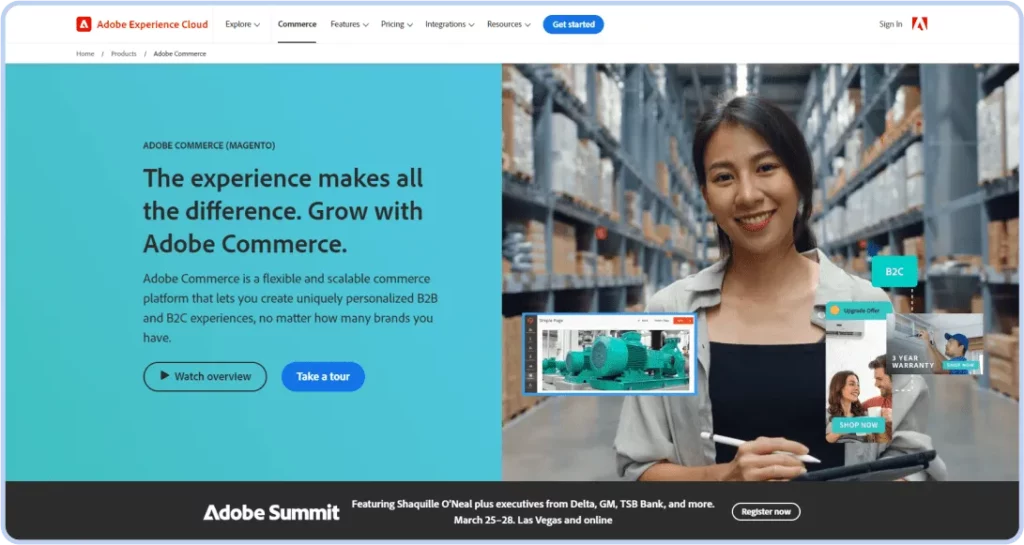
Features:
- Manage both your B2B and B2C sites from one single interface.
- Easy integration of third-party services.
- SEO-friendly URLs for better search engine visibility.
- Integrated with Google Analytics for detailed insights
- Different price range setting options for various customer groups like wholesalers and retailers.
Pros:
- SEO-friendly CMS with fast loading of websites
- Option to build a convenient mobile-friendly storefront for customers
- SSL security support for both frontend and backend orders
Cons:
- Requires programming knowledge to build site
- Higher development and maintenance cost
- Technical support is limited
Integration Options:
- Custom coding
- Third-party integration and more.
Customization Options:
Magento allows users to customize themes and templates, add customizable layouts, and use extensions and modules for their online stores.
Pricing:
Open Source: Free
Magento Commerce: $1,988/month
Biggest Clients:
- Olympus
- Ford
4. 6Valley
It is a comprehensive eCommerce CMS with multi vendor and single vendor business modes. With 6Valley you can organize multiple shops like digital stores, sports stores, home & living stores, etc under one platform. This CMS is fully mobile-optimized to give users the best experience possible. It’s a complete and market-ready solution that anyone can use to launch their eCommerce business and manage the system without being a pro programmer.
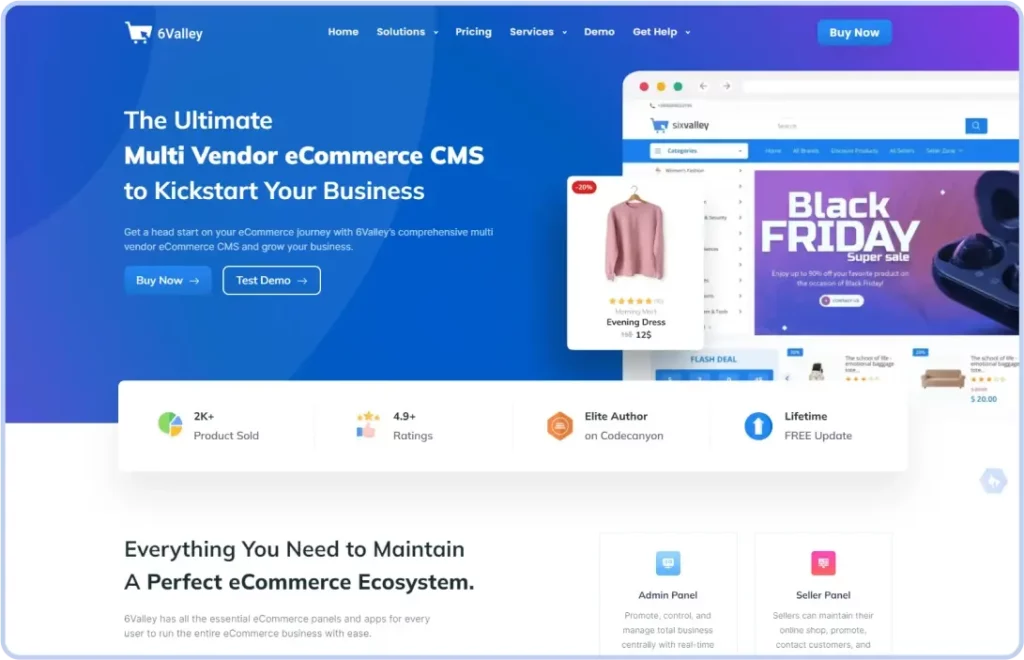
Features:
- Manage your business in both single vendor and multi vendor modules from one platform.
- Can sell both digital and physical products
- Comes with international shipping support
- All the apps are available for both Android and iOS
- Multiple themes for different business needs and choices
Key Differences with other CMS: Along with the essential web panels, 6Vallley comes with a User App, Seller App, and Deliveryman App that supports both Android and iOS devices. So unlike other CMSs, you won’t have to bear the hassle of launching or developing different mobile apps from scratch. You’re getting all of it within this launch-ready solution.
Pros:
- Comes with 2 super web panels and 3 mobile applications to offer the complete and market-ready solution
- Option to sell both in-house and other sellers’ products from one platform
- Both online and offline payment methods make it convenient for business owners and users.
- Without any extra plugins and extensions you can run your eCommerce business smoothly
Cons:
- Deliveryman app is an addon
Integration Options:
- Multiple payment methods
- Social media platforms
- Google Map APIs
- Mail and SMS Configuration
- Recaptcha and many more
Customization Options: 6Valley is a fully customizable CMS that allows you to make your brand and business website unique. With 6Valley you have full control to customize the system either by yourself or by taking expert help from their active support team.
Pricing:
Regular license: $79
5. Jumpseller
A versatile eCommerce CMS with a diverse selection of website themes that you can customize. To build an intuitive interface and manage online stores effortlessly this can be an ideal solution.

Features:
- Integration option for live chat support
- Social media promotion capabilities
- Diverse selection of free and paid website themes
- Multiple payment gateways
- SEO optimization option
Pros:
- Scalable for different sizes of businesses
- Multiple payment currencies to serve a wide range of customers
- Targeted promotion run and management to increase sales
Cons:
- Limited customization options in a few themes
- Few third party themes available
Integration Options:
- Social Media Platforms
- Google Calendar and more
Customization Options:
Jumpseller allows you to customize your store through editing HTML and CSS.
Pricing:
Basic: $11/month
Pro: $42/month
Biggest Clients:
- Fanyc
- Inverfast
6. Drupal
Drupal is one of the most widely used content management systems, even if not specifically designed for eCommerce. It allows combining different plugins and frameworks to enable functionalities for an eCommerce website. This open-source system works as a framework to build a website rather than a comprehensive website builder.
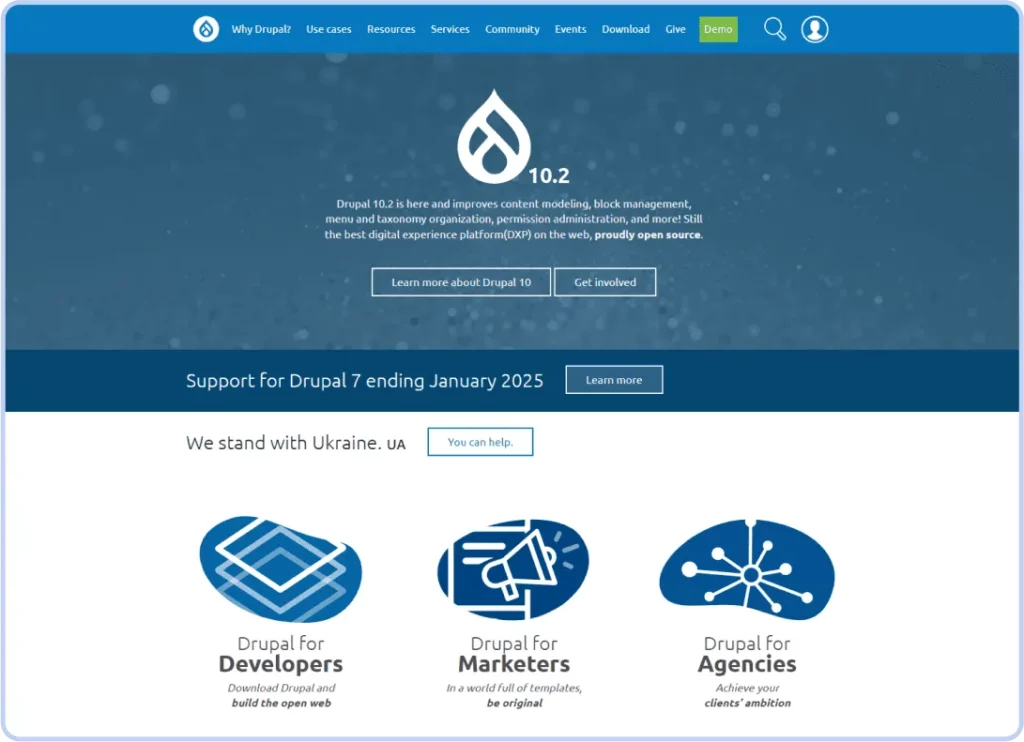
Features:
- Easy content creation with a user-friendly interface and WYSIWYG editor.
- Multi-language support with over 100 languages available.
- Drag-and-drop layout customization without code editing.
- Real time SEO to optimize Drupal posts as you create them
- Regularly updated security features to protect against attacks and bugs.
Pros:
- Highly customizable and flexible platform.
- Strong community support and extensive documentation.
- Scalable for handling large and complex websites.
Cons:
- Requires basic technical expertise to setup and customization
- Customizing requires expert developers’ help or help from Drupal Partners
- Steeper learning curve compared to other CMS platforms
Integration Options:
- Facebook Autopost
- HubSpot Integration
- Shorten URLs and many more
Customization Options:
Yes, Drupal eCommerce CMS allows customization through various modules, themes, etc to meet specific business needs and branding requirements.
Pricing:
Free of charge
Biggest Clients:
- TheSchoolRun
- Cartier
7. Joomla
eCommerce isn’t a core part of Joomla’s core functionality, yet by adding a shopping cart function extension to your site, you can use it as an eCommerce site. This content management system lets users build versatile web stores and publish content online.
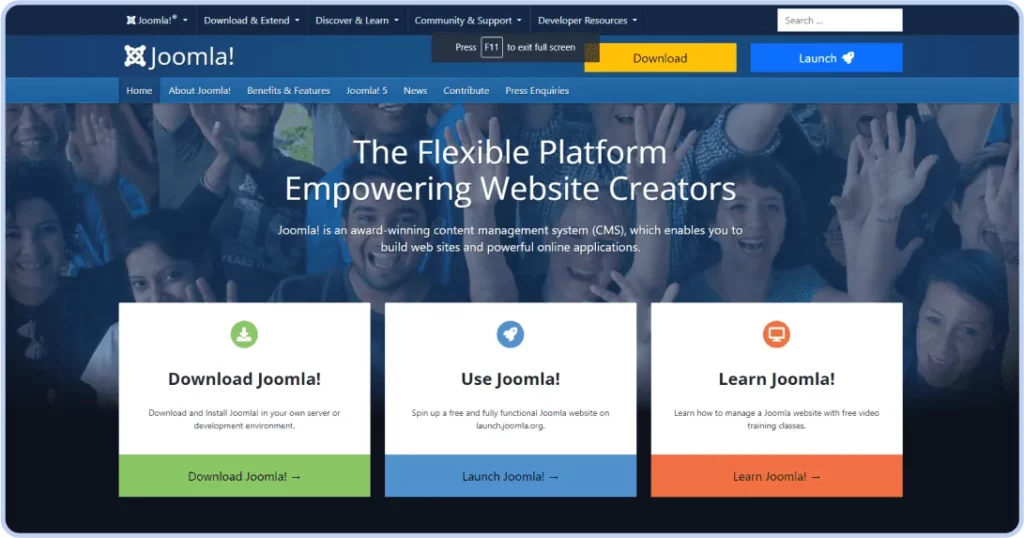
Features:
- Content editing and publishing with publishing tools and WYSIWYG editor
- Perfect responsive design with the usage of Bootstrap
- Website monetization option using banners or ads
- To add articles, users, and contacts, you will get 15 different field types
- For specific pages, specific templates can be assigned
Pros:
- Multilingual support with over 70 translation packs
- Free documentation and video training from the support community
- Powerful built-in SEO tools for making pages both user and search in friendly
Cons:
- Compatibility issues with certain extensions or templates during updates.
- A vast majority of templates are available only for premium users
- Limited adjustment options for your website
Integration Options:
- Google Analytics
- Cart Reminder
- Barcode Manager and many more
Customization Options:
You can customize the appearance, layout, and functionalities of your eCommerce store as per your business requirements.
Pricing:
Provides a Free Version
Paid Version: Starts at US$199.00
Biggest Clients:
- IKEA
- Lipton Ice Tea
8. BigCommerce
It is a SAAS-based eCommerce platform that helps empower businesses. With BigCommerce, it is possible to build e-commerce stores in multiple industries. BigCommerce delivers fast shopping experiences, bringing your website’s customers back for more.
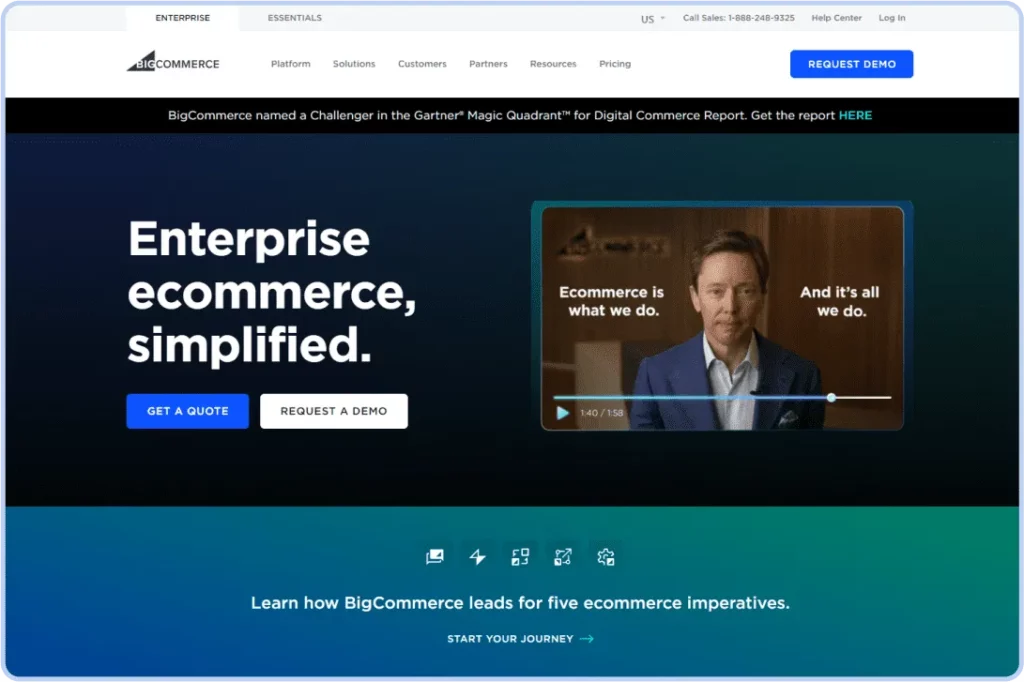
Features:
- Built-in analytics suit to track sales performance, report customer behavior and marketing ROI, etc.
- Intuitive dashboard and drag-and-drop editor for easy store setup and management.
- Customizable and SEO-friendly URLs to gain more traffic
- Multiple data centers for reliable backup of your store’s data
- Multi currency feature enables easy payment processing in over 100 currencies and local payment options.
Pros:
- Customer categorization option for tailored pricing, product access, and promotions without managing multiple sites
- Super fast site speed built on Google Cloud Platform and with the support of Cloudflare’s network
- Manage multiple unique storefronts from one dashboard, which is ideal for managing multiple brands or expanding across regions.
Cons:
- Only 12 themes are free in this CMS, which limits the customization option
- Auto updating of the plan after hitting a certain number of sales can increase costs.
Integration Options:
- Social Media
- Multiple Payment Gateways
- Live chat & AI and many more
Customization Options:
BigCommerce lets one customize product details, email templates, themes, checkout process, etc.
Pricing:
Standard: $29 / month
Pro: $299 / month
Biggest Clients:
- Sony
- Toyota
9. PrestaShop
It is a great option for startups and medium sized stores, which allows building a website without any development knowledge. This platform is freemium, so the core software is free and comes with premium features you can purchase if needed.
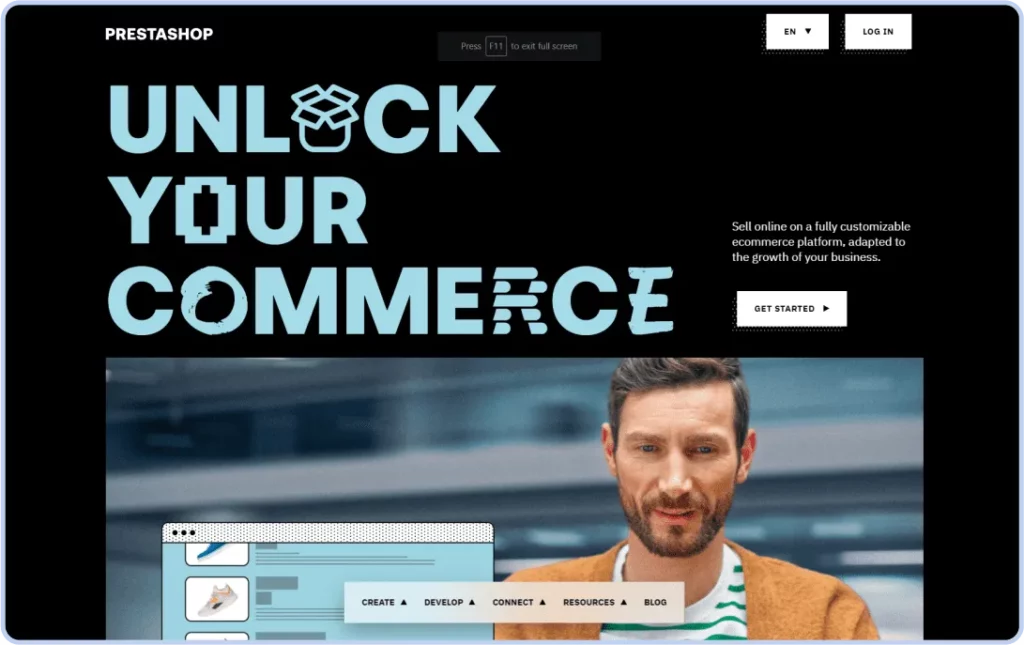
Features:
- A variety of themes and modules
- Multilingual support for a simplified translation process
- The back office product catalog page lets you get an overview of prices, including taxes
- Customers can personalize products before they buy
- To identify products, a product reference code is used
Pros:
- Fully customizable and scalable CMS
- As an open-source platform, it is free to download and use
- A wide range of free themes
Cons:
- No free support from the official support team, so people mostly rely on community forums
- High costs on premium templates and extensions
Integration Options:
- Google Marketing
- Loyalty, Referral, and Affiliate Program
- Captcha and many more
Customization Options:
It is a fully customizable eCommerce CMS that allows you to create and manage your store easily.
Pricing:
Free to download and use
Biggest Clients:
- Samsung
- Vodafone
10. Wix eCommerce
Although many people may assume Wix is a general website builder, it can act and function as an eCommerce CMS. It is suitable for beginners and noncoders. It offers a range of over 500 free eCommerce website templates with unique styles.

Features:
- Mobile-friendly design for all devices
- Built-in blogging feature for engagement and growth
- Custom domain options for branding
- Secure debit/credit card payments
- Multilingual support for global expansion
Pros:
- Free SSL certificate for enhanced security
- Built-in SEO tools to improve discoverability
- Flexible product management for up to 50K items
Cons:
- Limited scalability for larger businesses
- Limited third-party integrations compared to other platforms
- Cannot change templates once the site is created
Integration Options:
- Google Drive
- Microsoft Excel
- Paypal and many more
Customization Options:
Limited customization options as you have to work using the integrated templates and designs. But you can personalize your site by adjusting colors, fonts, layouts, etc.
Pricing:
Business Basic: $17 /mo
Business Unlimited: $25 /mo
Biggest Clients:
- Tesla
- AirAsia
11. Squarespace Commerce
If you are seeking a solution solely designed for beginners to create eCommerce websites without coding, then Squarespace is for you. It offers drag-and-drop tools and templates for easy store building. The platform integrates essential eCommerce services like social media solutions and email marketing.

Features:
- Photo upload option from phone to your website
- Fully integrated commenting system with threaded comments and like counts
- Can lock entire website with a password for security
- Responsive design so your content looks great on all devices
- Provides complete podcasting support with platforms like Apple Podcast
Pros:
- User-friendly platform for beginners
- Easy content workflow management by publishing, drafting, and scheduling posts
- Google Workspace integration options to create a custom email address that matches your domain to build brand value and reduce spam filter risks
Cons:
- Limited customization option
- Limitations in terms of advanced SEO capabilities
- Lack of advanced eCommerce features
Integration Options:
- Social Media Accounts
- Marketing Tools
- Forms and many more
Customization Options:
Squarespace enables a customization option once you create a store page and lets you customize the layout and style before you add products.
Pricing(For monthly payment plan):
Personal: $23/mo
Commerce (BASIC): $36/mo
Biggest Clients:
- National Geographic Kids
- Lyft Business
12. OpenCart
This platform is known for its simplicity and customization options. With OpenCart, it’s easy to set up and customize your online store as it offers a variety of templates and plugins. It also offers seamless integration with multiple payment gateways and shipping methods – making it a popular choice for businesses of all sizes. It is a flexible and scalable platform without hefty monthly fees.
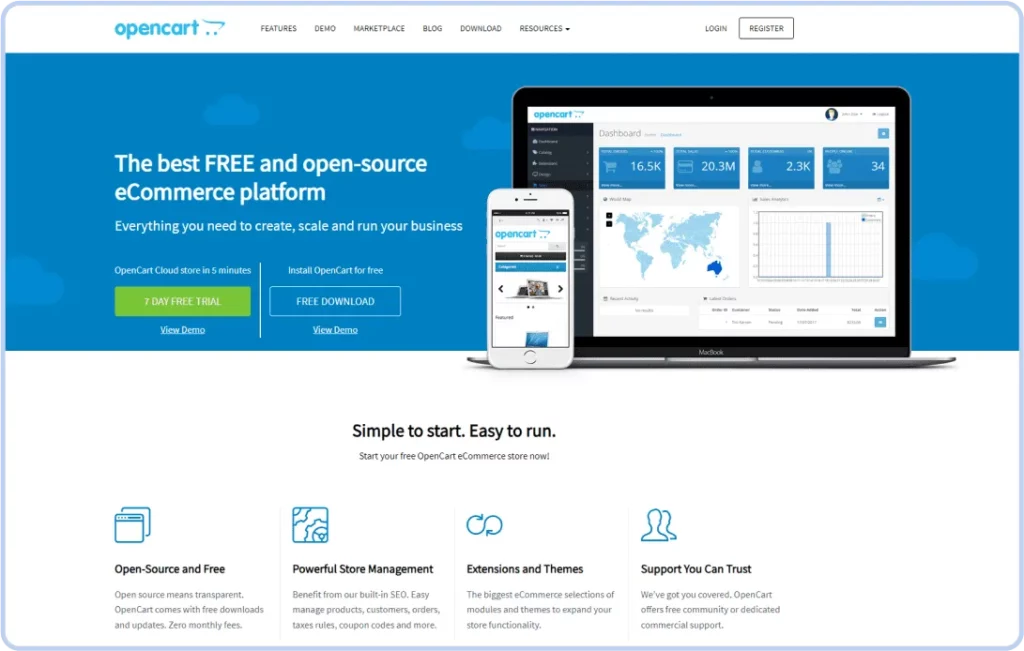
Notable Features:
- You can easily control user access and privileges for different roles of your eCommerce store
- Manage the catalog by organizing your products with unlimited categories and subcategories
- Multi currency option provides automatic rate updates and customizable tax settings
- Translation option in any language to expand in new markets
- The extension installer helps upload modules with a few clicks
Pros:
- A vast range of themes and plugins with 13 000+ additional extensions
- No monthly fees, making it cost-effective for small-budget businesses
- A wide range of templates and plugins available for quick setup
Cons:
- Hosting options may require additional costs
- Template-based systems may limit design flexibility for advanced users
- Limited customer support options compared to paid platforms
Integration Options:
- Multiple Payment Gateways
- Various Shipping Methods and more
Customization Options
For a personalized eCommerce experience, you can customize your eCommerce store’s home page, colors, fonts, and overall design.
Pricing:
Core system: Free
Few extensions and themes: Paid
Biggest Clients:
- Rover
- Call of Duty
13. HubSpot
While not designed for eCommerce solely, you can seamlessly integrate it with leading eCommerce platforms. As a versatile CMS and marketing automation platform it will help you gain insights into customer behavior, automation of your marketing campaigns, and track revenue streams. It offers comprehensive solutions for businesses looking to enhance their online presence and drive sales.
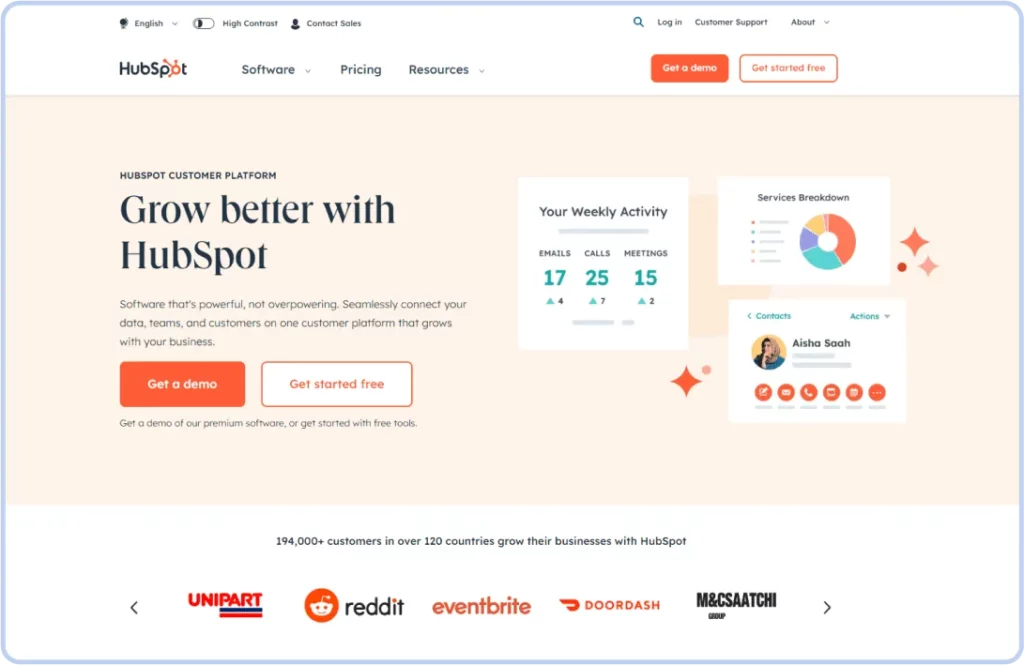
Features:
- Advanced marketing automation tools
- Seamless integration with leading eCommerce platforms like Shopify
- Intuitive and user-friendly interface for easy website management by users of all technical levels
- Mobile responsiveness ensures optimal viewing experience across various devices
- The analytics feature provides valuable insights into website performance and marketing campaign effectiveness
Pros:
- Extensive SEO tools to improve website visibility and ranking
- Powerful marketing automation features for driving sales and customer engagement
- Flexible open API systems for integrating with various third-party applications
Cons:
- Lacks dedicated eCommerce functionalities compared to other specialized platforms
- Pricing may be higher compared to standalone eCommerce CMS solutions
- Beginners may find it difficult to learn the interface and features
Integration Options:
- Existing eCommerce, financial, and communication system
- Compatible with various third-party applications such as Facebook, Mailchimp, etc.
Customization Options:
Hubspot lets you customize page content with settings along with optimizing pages for search engines.
Pricing:
Free Version
Starter: 23$ / month
Enterprise: $1,200/month
Biggest Clients:
- DoorDash
- eBay
14. Sitecore
This enterprise-level eCommerce CMS lets you manage your website, automate marketing, and engage customers. It provides a user-friendly functionality to empower businesses with impactful digital experiences across multiple channels. Sitecore is trusted by major brands worldwide. It mainly focuses on content management, personalized, and details analytics.

Features:
- The personalization feature enables the delivery of tailored content and experience
- Powerful analytics and reporting tool to track website performance
- Multichannel marketing automation for targeted communication and engagement
- Campaign management to create and track with unique links
- Publishing service to streamline the process and monitor item status
Pros:
- Multilanguage support to deliver content globally
- Real-time insights into visitor behavior and content performance
- Scalable to handle high traffic and complex content management needs
Cons:
- Can be complex to implement and manage for some developers
- Typically more expensive compared to other eCommerce CMS options
- Difficulties due to differences in data formats and protocols, requiring custom integration layers
Integration Options:
- Third party applications
- Scroll API and many more
Customization Options:
With customization, you can meet business-specific needs, personalized content, and seamlessly integrate third-party systems.
Pricing:
License Cost: Subscription based
Partner Cost: For development and maintenance
*For detailed pricing they prefer email communication
Biggest Clients:
- United Airlines
- L’Oréal
15. Shift4Shop
Site4Shop, Basically built for US business owners, it offers an intuitive interface and versatile site-building tool. It supports digital products and tickets with complemented features such as free themes, fraud protection, and advanced inventory management.

Features:
- Offers unlimited hard dish storage
- Support for digital products and event ticket sales
- Bulk quantity discounts for customers to buy more products at once
- Reward points loyalty programs for customer retention
- Payment acceptance options in Apple Pay and Google Pay
Pros:
- Built-in blog feature for enhancing SEO and boosting sales
- Benefit from a wide range of features included in the base software at no additional cost
- Choose from over 100 free themes to customize the appearance of your online store
Cons:
- Availability is limited to US businesses only
- Not very intuitive and user-friendly
Integration Options:
- Google Analytics
- Store Locator Widget and more
Customization Options:
Theme customization is available in Shift4Shop. Along with it, your customers can provide their own image if the product designer functionality is enabled for them.
Pricing:
End-to-End eCommerce: Free
Basic Store: $29.00/ month
Biggest Clients:
- Faith Vessels Pottery
- A&G Design Md
16. Zen Cart
It is a versatile, open source, and one of the most popular eCommerce CMS. It serves diverse business needs by providing support for multiple languages, currencies, and hosting providers. Due to its open-source nature, it is required to have some technical knowledge.
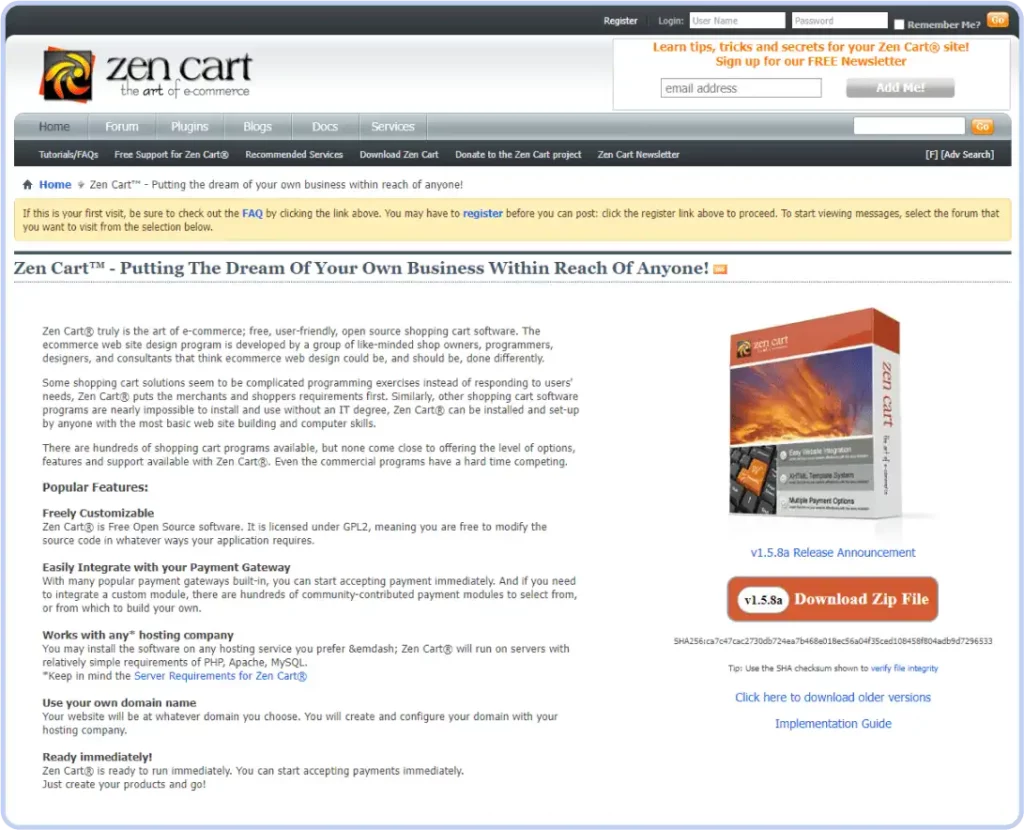
Features:
- Manage meta tags keywords and descriptions for each product directly from the admin interface.
- Optimized for viewing on various devices, including tablets and smartphones.
- Products can be linked or copied to multiple categories for easier organization.
- Configure the Contact Us page to support multiple destinations such as Sales, Technical Support, and Webmaster.
- Easily configure tax rates, tax zones, and other tax-related settings in the admin area.
Pros:
- High customization capabilities
- Seamless payment gateway integration for immediate transactions
- Compatible with various hosting providers, offering flexibility in server selection
Cons:
- Requires some technical knowledge for customization and maintenance
- Interface may not be as intuitive for beginners
- Limited official support compared to paid platforms
Integration Options:
- Payment Gateways
- Third-party plugin and add-on integration for additional features and functionality
Customization Options:
- Admin configuration changes
- Sideboxes and Banners
- Zen Cart color scheme and many more to additional modules and add ons.
Pricing:
Base software: Free
*Fees will apply for hosting, security, third-party integrations, and custom development
Biggest Clients:
- 1mg Pharma
- 72HRPrint.com
Now if you feel overwhelmed reading all this information all at once and need a comprehensive idea based on different business goals then the table below is made for you:
| Business Goal | Ideal Platform |
| Popular Option | Shopify |
| Beautiful Websites | Squarespace |
| Economical Platform | WooCommerce |
| Affordable Option | PrestaShop, Zen Cart, WordPress, Drupal, Joomla, |
| Large Scale Business | Magento |
| Easy Integration | BigCommerce, Shopify |
| Seamless Marketing | HubSpot eCommerce CMS |
| Complete Ecosystem | 6Valley |
Table: Ideal eCommerce CMS platforms based on different business goals
Types of Content Management Systems
As you now know about the top CMS options available on the industry and on the verge of choosing one – it’s time to dive deeper into seeking knowledge. This section will help you to have a clear idea about different types of content management systems to choose the one that aligns with your business needs.
Open Source CMS
These platforms are built on publicly accessible source code. That means you can modify and redistribute it freely.
For example, think of it as you’re building your dream house from scratch where you have the flexibility and control over design and construction. Just for this, you need some skills.
Characteristics:
- Community-driven development
- Flexibility for customization
- Wide range of plugins and extensions
Examples: WordPress, Joomla, Drupal
Saas CMS
It provides a cloud based solution for website development through a monthly subscription model. These solutions are owned and managed by specific companies. They charge their users for accessing their services. Even though the customization option isn’t as flexible as other types of CMS it comes with content creation tools, templates, and hosting services.
Characteristics:
- Monthly subscription model
- Owned and maintained by specific companies
- Cloud-hosted web development interface
Examples: HubSpot ( CMS Hub), Shopify
Custom Built CMS
These are tailored solutions developed specifically for individual projects or businesses. It requires significant investment and technical expertise to build and maintain. If you have a long-term plan for your eCommerce website then you can consider this one.
Characteristics:
- Unique features and functionalities
- Full control over design and architecture
- Higher development costs and longer time to market
Examples: In-house developed systems, solutions built by web development agencies for their clients
Pre-built CMS
These platforms are ready-made solutions that come with complete and market-ready templates & features to launch business immediately. It doesn’t require extensive development knowledge.
Characteristics:
- Ready-to-use templates and themes
- Quick setup and deployment
- Lower cost compared to custom development
Examples: 6Valley – a complete multivendor eCommerce CMS that helps you kickstart and grow your business. It is equipped with all the necessary eCommerce panels and apps that make running an online store a breeze. You can use it to handle everything from inventory management to payment processing without any hassle. It’s the perfect solution for anyone looking to start or scale their eCommerce business.
Final Thoughts
The best eCommerce CMS isn’t the one that the majority of the world is using, rather, it is the one that compliments your business. There’s no one-size-fits-all answer when it comes to the best because everybody has different businesses and plans. So, it’s necessary to take time to research and analyze based on budget, needs, and goals before choosing one.
Remember, to carefully consider the options and the type that you’re going for – and if confused, go through this blog again for help.
We hope this blog answers your queries. See you in the next one!
FAQs
Are open-source platforms like WordPress free to use?
While the core software is free, you might need to pay for additional features, themes, plugins, and web hosting.
I’m a complete beginner with no coding experience. Which CMS is best for me?
Pre-built eCommerce platforms like 6Valley are great options for beginners due to their user-friendly interfaces and ready-to-launch functionalities.
What are some additional costs I should consider besides the CMS platform itself?
Think about domain name registration, web hosting, payment processing fees, and potentially additional plugins or themes required for your specific needs.
Which CMS platform is best for e-commerce?
The best CMS for e-commerce depends on various factors, such as your business requirements, budget, technical expertise, and scalability needs. What works for someone else might not be the ideal fit for your venture. Take the time to assess your specific needs and goals before making a decision.
Meet Mehrin! A technical writer with a Computer Science background. She combines her academic knowledge & creativity to transform complex facts into engaging content. With a sharp eye for detail, she keeps readers updated on tech trends. Outside of writing, she’s a visual storyteller, capturing life’s moments through photography.













